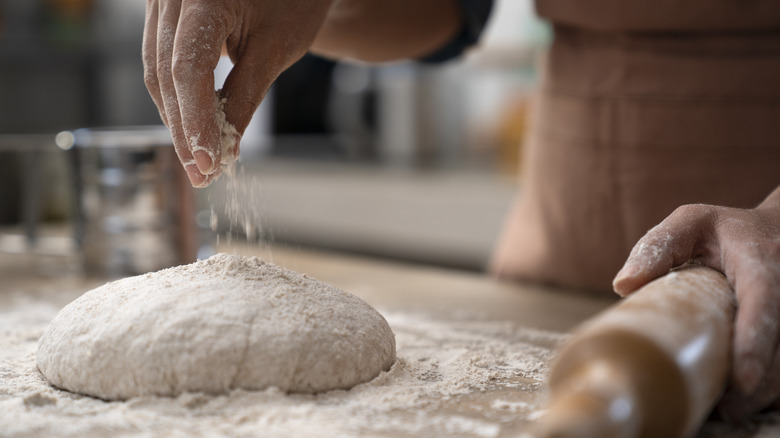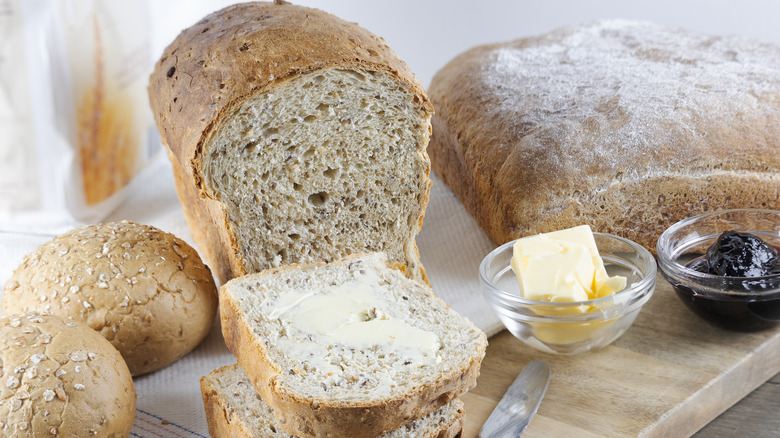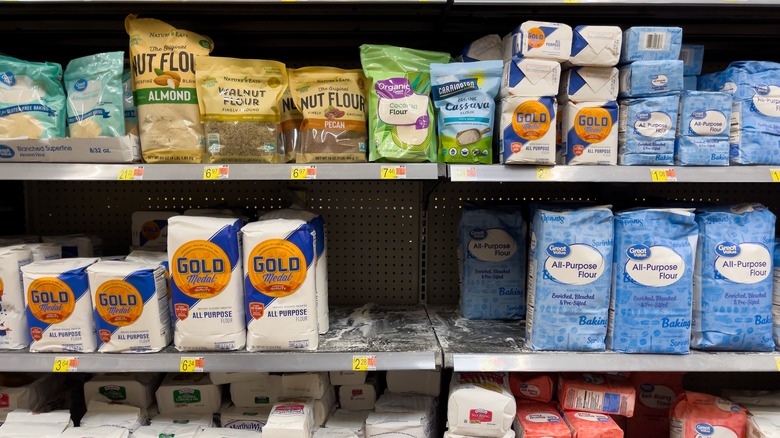How Much Money Can You Really Save By Making Your Own Bread?
Making your own homemade bread has somewhat of a reputation as something usually reserved for those that homestead. It's a homespun, quaint task that most of us forgo in favor of store-bought loaves. But with sky-high prices at the grocery store, more of us than ever are rolling up our sleeves and getting in the kitchen to try our hand at DIY recipes, if it means saving money.
However, it means you'll have to stock up on supplies, invest in a bread maker (or learn to make homemade bread without), and endure the somewhat laborious task of making your own loaves each week. So, if you're planning to go through all that trouble, you'll need to know the payoff. Is making your own bread truly a cost saver compared to grabbing a store-bought loaf? And if so, is it enough to make it worth the work?
The Spruce Eats crunched the numbers a few years ago, but as we all know, prices are ever-changing. At the end of the day, the price per loaf can vary widely depending on the brand and quality of ingredients you choose. It also depends on the store-bought brand and type of bread you're comparing it to. Prices for all components involved can range by many dollars, but in general, it's possible to save some pennies. Plus, the control over ingredients and the improved taste could tip the scales further in the "worth it" direction for you.
The approximate price for a loaf of white bread
The cheapest loaf of plain white bread at the grocery store can be anywhere from $1.50 on the lowest end to $2.00 or $3.00. If you choose a whole wheat variety, plan to pay more — upwards of $3.50, certainly. It's easy to pay north of $6.00 a loaf if you pick up a whole grain or "healthier" option. To make your own basic loaf of white bread, plan to pay about $1.04 for one pound of King Arthur's all-purpose flour, about 62 cents for the yeast packet, 4 cents for a tablespoon of salt, and around 1 cent for two tablespoons of oil. Of course, all these numbers can vary, and they don't account for elbow grease and time.
Not to be forgotten is the cost of energy. According to the U.S. Energy Information Administration (EIA), the national average residential electricity price is about 16 cents per kilowatt-hour as of 2023. If your oven uses 2800 watts (you can find your model's number by checking the owner's manual), baking a loaf for 30 minutes costs around $0.22.
Totaling all this up, not including oven preheating time, that homemade loaf costs about $1.93. If you go through an average of one loaf of bread per week, over the course of the year, you could be spending $156 on mid-range, store-bought bread (averaging $3.00 per loaf). Compared to the at-home price of $1.93, you'd only spend around $100, for a savings of $56 per year.
Save or spend more, depending on ingredients and other factors
Of course, not all ingredients are created equal. This goes for flour, yeast, and even salt. Are you using an inexpensive canola oil (this is one of the times to save your money on premium olive oil!) or shelling out for pricier options? Are you picking up your ingredients at your local neighborhood Walmart or Costco, known for sending shoppers on treasure hunts for big savings, or at a boutique grocery where prices run far higher? All these factors matter and can greatly skew the final numbers.
If you use the absolute cheapest store-brand ingredients (not the choosier King Arthur flour we used in this scenario) and cut corners wherever possible, you could get that total down even further. This means your savings will be even steeper — for many, it's enough to make it worth the work. You could also make multiple loaves at once, cutting down on the unaccounted-for time and labor, and making the most of the energy expense. Using gadgets like this KitchenAid attachment can make bread-making more effortless as well.
And of course, the cheapest store-bought breads include far longer ingredient lists than your homemade loaf. If avoiding things like high fructose corn syrup, preservatives, and other unpronounceable ingredients is important to you, this might be a crucial factor. But the cost of freshly baked bread emanating from your kitchen on the regular is (almost) priceless.


